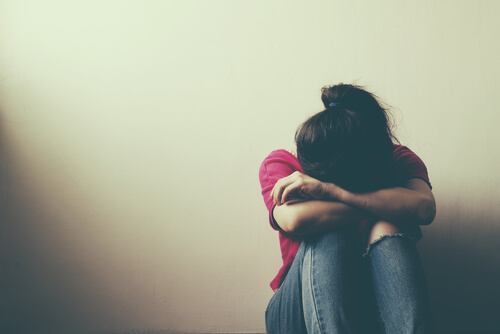Do You Have Experiential Avoidance Disorder?


Written and verified by the psychologist Gema Sánchez Cuevas
The classifications of psychological disorders and their therapies are always changing. One model of third wave therapy, called Acceptance and Commitment Therapy, says that a lot of psychological suffering is caused by experiential avoidance disorder.
There are many examples of experiential avoidance disorder. Often it occurs in situations that a person with this disorder sees as undesirable. So they’ll try not to have to deal with the situation by avoiding it or running away.
However, not wanting to deal with discomfort, or wanting to run away from it instead of accepting it, isn’t a disorder. It’s actually just a normal response we see in every kind of animal. The disorder happens when someone has rigid thoughts like,
- “I have to feel good to do things,”
- “My work makes me unhappy,”
- “I can’t take being nervous, I need this to end.”
These are all a source of discomfort that don’t give you any breaks.
How do you know if you have experiential avoidance disorder?
The things that determine if you have experiential avoidance disorder are:
- Constantly feeling flooded by thoughts and feelings that revolve around “feeling bad,” “being sad,” or “fighting to feel good.”
- Your mind constantly bombards you with thoughts that fight against discomfort, uncertainty, or doubt.
- Spending a lot of your day to day time controlling these thoughts.
- Your daily life revolves around “getting rid of discomfort” before you can get your life back. You start to have the feeling that you can’t do anything. That feeling will get bigger until those thoughts disappear.
- You wait to feel okay before you do things you value (going to the park with your kids, spending time with friends, or walking along the beach).

Where does experiential avoidance disorder come from?
The root of experiential avoidance disorder is being psychological rigid when dealing with discomfort. Whether by avoiding it or running away from it. This inability to adapt is what causes experiential avoidance disorder. The life of anyone with it revolves around avoiding painful feelings or thoughts.
Being psychologically rigid means that the person closes themselves off from painful thoughts, emotions, or memories. They’re not flexible and will keep on with daily activities meant to bring them well-being.
Even if they have one or many sources of discomfort. They have the idea that they have to “feel good” before they can enjoy anything.
When someone has a pre-existing psychological problem like anxiety or depression, this inflexibility has a negative impact on them. Not accepting the discomfort tof anxiety or depression, and trying to get rid of it to pick your life up has two consequences:
- Basing your life around the discomfort and trying to control it just makes it worse. We have to remember that our minds never stop turning. It’s sort of like a cauldron on top of a never-ending fire. If you try to stop thinking about sadness and anxiety you’ll end up using more of that thought as a fuel for the flame.
- Turning your day to day life into a fight against discomfort reduces the reinforcements or rewards you can “aspire to.” You’ll have less activities that bring you well-being. Plus, you’ll neglect your interpersonal relationships, and isolate yourself inside the discomfort.
The trap of “feeling good”
We live in a society that promotes well-being, enjoyment, and keeping suffering as far away as possible. We look badly on crying, being sad, and feeling anxious. So when you experience any of these feelings or emotions, you fight against them.
The more “feeling good” turns into the main, central element of your life, the farther you fall into its trap. Looking for a perfect sense of well-being is what makes you so watchful. You focus on the negative emotions that are actually normal and have adaptive purposes.
By being concerned with whether you’re feeling good or bad, you end up picking up on every unpleasant psychological experience. You just give them importance. By trying to push away those negative psychological experiences (thoughts and feelings), you’re making them stronger.

Consequences of experiential avoidance disorder
On a social level, the consequences of experiential avoidance disorder are extremely important. You wait to feel good to go to the movies, spend time with friends, pick school back up, go on dates, and an infinity of other things. You develop habits to try and avoid unpleasant psychological experiences. As the months and years pass your life revolves entirely around avoidance.
That’s how you can end up turning into a true expert in what you don’t want. You exclusively determine your wants and desires on keeping out whatever you’re trying to avoid. Your identity and projections for the future end up being very weak.
Experiential avoidance does nothing but aggravate the symptoms associated with discomfort and make your emotional life worse. That’s why Acceptance and Commitment Therapy (developed to overcome experiential avoidance disorder) centers itself around accepting discomfort. It’s also about establishing goals based on personal values.
Treatment for experiential avoidance disorder
First, you can find the solution to this disorder in acceptance. That means unconditional, non-judgmental observation of your psychological experiences, like thoughts, emotions, and feelings.
Acceptance and commitment therapy uses various strategies like mindfulness, cognitive defusion, and therapeutic metaphors to achieve that goal.
Second, treatment for experiential avoidance disorder brings back the importance of personal values in the face of emotions.
That’s where the word “commitment” comes from in this therapy. It tries to get you to commit to your values no matter what. It tries to discard the fight against discomfort.

Fighting this disorder is a difficult journey. But it’s something you have to do to get out of thought traps and rigid beliefs.
These are the things that you use to try to feel good, but they end up making you feel worse. Centering your life around personal values and accepting the discomfort of living life will make you feel freer and happier.
The classifications of psychological disorders and their therapies are always changing. One model of third wave therapy, called Acceptance and Commitment Therapy, says that a lot of psychological suffering is caused by experiential avoidance disorder.
There are many examples of experiential avoidance disorder. Often it occurs in situations that a person with this disorder sees as undesirable. So they’ll try not to have to deal with the situation by avoiding it or running away.
However, not wanting to deal with discomfort, or wanting to run away from it instead of accepting it, isn’t a disorder. It’s actually just a normal response we see in every kind of animal. The disorder happens when someone has rigid thoughts like,
- “I have to feel good to do things,”
- “My work makes me unhappy,”
- “I can’t take being nervous, I need this to end.”
These are all a source of discomfort that don’t give you any breaks.
How do you know if you have experiential avoidance disorder?
The things that determine if you have experiential avoidance disorder are:
- Constantly feeling flooded by thoughts and feelings that revolve around “feeling bad,” “being sad,” or “fighting to feel good.”
- Your mind constantly bombards you with thoughts that fight against discomfort, uncertainty, or doubt.
- Spending a lot of your day to day time controlling these thoughts.
- Your daily life revolves around “getting rid of discomfort” before you can get your life back. You start to have the feeling that you can’t do anything. That feeling will get bigger until those thoughts disappear.
- You wait to feel okay before you do things you value (going to the park with your kids, spending time with friends, or walking along the beach).

Where does experiential avoidance disorder come from?
The root of experiential avoidance disorder is being psychological rigid when dealing with discomfort. Whether by avoiding it or running away from it. This inability to adapt is what causes experiential avoidance disorder. The life of anyone with it revolves around avoiding painful feelings or thoughts.
Being psychologically rigid means that the person closes themselves off from painful thoughts, emotions, or memories. They’re not flexible and will keep on with daily activities meant to bring them well-being.
Even if they have one or many sources of discomfort. They have the idea that they have to “feel good” before they can enjoy anything.
When someone has a pre-existing psychological problem like anxiety or depression, this inflexibility has a negative impact on them. Not accepting the discomfort tof anxiety or depression, and trying to get rid of it to pick your life up has two consequences:
- Basing your life around the discomfort and trying to control it just makes it worse. We have to remember that our minds never stop turning. It’s sort of like a cauldron on top of a never-ending fire. If you try to stop thinking about sadness and anxiety you’ll end up using more of that thought as a fuel for the flame.
- Turning your day to day life into a fight against discomfort reduces the reinforcements or rewards you can “aspire to.” You’ll have less activities that bring you well-being. Plus, you’ll neglect your interpersonal relationships, and isolate yourself inside the discomfort.
The trap of “feeling good”
We live in a society that promotes well-being, enjoyment, and keeping suffering as far away as possible. We look badly on crying, being sad, and feeling anxious. So when you experience any of these feelings or emotions, you fight against them.
The more “feeling good” turns into the main, central element of your life, the farther you fall into its trap. Looking for a perfect sense of well-being is what makes you so watchful. You focus on the negative emotions that are actually normal and have adaptive purposes.
By being concerned with whether you’re feeling good or bad, you end up picking up on every unpleasant psychological experience. You just give them importance. By trying to push away those negative psychological experiences (thoughts and feelings), you’re making them stronger.

Consequences of experiential avoidance disorder
On a social level, the consequences of experiential avoidance disorder are extremely important. You wait to feel good to go to the movies, spend time with friends, pick school back up, go on dates, and an infinity of other things. You develop habits to try and avoid unpleasant psychological experiences. As the months and years pass your life revolves entirely around avoidance.
That’s how you can end up turning into a true expert in what you don’t want. You exclusively determine your wants and desires on keeping out whatever you’re trying to avoid. Your identity and projections for the future end up being very weak.
Experiential avoidance does nothing but aggravate the symptoms associated with discomfort and make your emotional life worse. That’s why Acceptance and Commitment Therapy (developed to overcome experiential avoidance disorder) centers itself around accepting discomfort. It’s also about establishing goals based on personal values.
Treatment for experiential avoidance disorder
First, you can find the solution to this disorder in acceptance. That means unconditional, non-judgmental observation of your psychological experiences, like thoughts, emotions, and feelings.
Acceptance and commitment therapy uses various strategies like mindfulness, cognitive defusion, and therapeutic metaphors to achieve that goal.
Second, treatment for experiential avoidance disorder brings back the importance of personal values in the face of emotions.
That’s where the word “commitment” comes from in this therapy. It tries to get you to commit to your values no matter what. It tries to discard the fight against discomfort.

Fighting this disorder is a difficult journey. But it’s something you have to do to get out of thought traps and rigid beliefs.
These are the things that you use to try to feel good, but they end up making you feel worse. Centering your life around personal values and accepting the discomfort of living life will make you feel freer and happier.
This text is provided for informational purposes only and does not replace consultation with a professional. If in doubt, consult your specialist.







